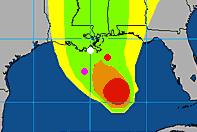Welcome To A Warming Planet
Posted by Big Gav
Well - everyone is freaking out today about Hurricane Katrina today, and with good reason it would seem, as it may be the strongest hurricane to hit the Gulf region ever.
The Oil Drum has a great round up of all the news, with Prof Goose and the team putting in a great effort providing continuous updates on the news and all the oil and gas related infrastructure in the path of the storm. Most of New Orleans has apparently been evacuated and hopefully those who remain behind come through unscathed.  It seems everyone else has commented on this already - Mobjectivist, MonkeyGrinder, WorldChanging, MEJ, Jeff Vail (who also notes the similarity to the "Oil Storm" scenario), Stirling Newberry and even the parahistorians at RI who came up with the freaky picture to the side of Hurricane Isabel - and no, I don't know if its doctored. Jeff W's comment is interesting in light of the prevailing theory that global warming is making tropical storms more intense, but not more frequent. Maybe that is true globally but perhaps the idea that the failure of the Gulf Stream will mean more GOM hurricanes is worth watching.
It seems everyone else has commented on this already - Mobjectivist, MonkeyGrinder, WorldChanging, MEJ, Jeff Vail (who also notes the similarity to the "Oil Storm" scenario), Stirling Newberry and even the parahistorians at RI who came up with the freaky picture to the side of Hurricane Isabel - and no, I don't know if its doctored. Jeff W's comment is interesting in light of the prevailing theory that global warming is making tropical storms more intense, but not more frequent. Maybe that is true globally but perhaps the idea that the failure of the Gulf Stream will mean more GOM hurricanes is worth watching.
Still, here we are, in another moment, where dystopic hallucinations have become wire stories with headlines such as "Experts Expect Katrina to Turn New Orleans Into Atlantis." I'm expecting the storm to weaken enough that the worst-case will not be realized. I'm hoping so for the poorest of New Orleans, who "chose" not to leave because they couldn't, and have been sitting up all night in the Superdome. But Katrina is already the 11th hurricane this season; that's eight more than have been recorded before at this time of the year. The storms are increasing in frequency and ferocity, and will continue to do so as the Gulf Stream fails. All that heat has to go somewhere.
Oil prices have hit an all time record (in both real and inflation adjusted terms).

Crude oil soared to a record above $70 a barrel in New York after Hurricane Katrina forced companies including Exxon Mobil Corp. and Chevron Corp. to shut operations in the Gulf of Mexico, where 30 percent of U.S. oil is produced.
Oil had its biggest gain in 29 months as Katrina may become the strongest storm to hit the Gulf coast since 1969. Hurricane Ivan last September cut oil output by as much about a third. Natural gas, heating oil and gasoline all rose to records today. ``It's as bad as it can get,'' said Marshall Steeves, an oil analyst at Refco Inc. ``Hurricane Ivan came through almost a very similar tract and did a tremendous amount of damage.''
Katrina is a Category-5 storm, the most severe on the Saffir-Simpson scale of hurricane strength. It would be only the fourth storm of that magnitude to hit the U.S. since the government began keeping storm records. Category 5 hurricanes, with winds greater than 155 mph (249 kph) can tear roofs off homes, blow down all trees and shrubs, and cause flooding.
States of emergency have been declared in Louisiana and Mississippi. New Orleans, a city of 500,000 within a metropolitan area of 1.3 million, is being evacuated of all but essential personnel. Much of the city, 100 miles upriver from the Gulf, lies below sea level.
``The storm is more severe than we've thought; it's turned into a monster,'' said Paul Sankey, senior oil analyst with Deutsche Bank Securities in New York. ``The amount of lost production is equal to almost all the spare capacity in the world.''
Oil prices jumped 22 percent in the month after Hurricane Ivan, the third most costly hurricane in U.S. records, tore through the Gulf last September, toppling platforms and damaging underwater pipelines.
Rigzone reported on the likely impact the state of Florida, which istotally dependent on the Louisiana refineries for its supplies.
The impact was immediate Sunday night on the New York Mercantile Exchange, as crude oil futures spiked $4.50 per barrel, putting the cost above $70 for the first time since oil began trading there in 1983. Every additional $1 per barrel translates into more than 2 cents in the price of a gallon of gasoline. Gas prices already are up an average 83 cents a gallon this year.
``Monday morning, take every penny in your wallet and invest in oil, because the hurricane is projected to come in in the heart of the gas and oil port,'' said Ted Falgout, director of Port of Fourchon, a key oil and gas hub that sits 60 miles south of New Orleans on the Gulf of Mexico. ``Prices are going to go up.''
Florida in particular would feel the impact: As much as 90 percent of the state's gasoline arrives by ship from oil refineries along the Mississippi River. Gov. Jeb Bush warned the fuel supplies at Florida ports, which seemed ample on Friday, now will not be enough in view of an expected shutdown of the refineries off the Louisiana coast.
 Bush and Cheney's obsession with the War on Terror / War for Oil (and its resulting funnelling of vast streams of cash into the coffers of their associated companies like Halliburton and the Carlyle Group) may come back to bite them if the disaster relief effort runs into problems and US taxpayers start to wonder why disaster relief programs have been gutted, as this New Orleans area article described.
Bush and Cheney's obsession with the War on Terror / War for Oil (and its resulting funnelling of vast streams of cash into the coffers of their associated companies like Halliburton and the Carlyle Group) may come back to bite them if the disaster relief effort runs into problems and US taxpayers start to wonder why disaster relief programs have been gutted, as this New Orleans area article described.Disaster in the Making
The Federal Emergency Management Agency's diminished capacity to handle natural disasters is especially worrisome to Louisiana.
Last month, an Associated Press poll showed that Americans were as concerned about being attacked by terrorists as they were about getting burglarized or losing their jobs. With such fears running high, it's natural that the Bush Administration, particularly in an election year, would want to put anti-terrorism efforts at the forefront. But few people, especially in a hurricane-prone state like Louisiana, should agree that anti-terrorism programs must compete for
federal money with natural-disaster recovery and prevention efforts. Make no mistake: Natural disasters will occur. Just ask our neighbors in Florida.
Last week's cover story "A Disaster Waiting to Happen" focused on changes that have occurred under the Federal Emergency Management Agency (FEMA) after it was absorbed into the Department of Homeland Security in 2002. FEMA insiders and emergency-management officials nationwide say the move spelled disaster for FEMA and for victims of catastrophic events. From 1993 until 2002, FEMA built a reputation as an effective, independent federal agency that responded to emergencies efficiently and made disaster mitigation a priority. But some FEMA employees and many who work closely with the agency say that when it became a subdivision of the Department of Homeland Security, FEMA's ability to handle natural disasters fell off significantly. Now, it must compete against anti-terrorism efforts for funding.
Commenter JLA at TOD also noted "we should also be hearing a lot about how stupid, reckless, and irresponsible it has been to allow Louisiana's natural defense against hurricanes - its ecologically rich and diverse bayou - to dissappear as the natural process of flooding and silt deposition has been halted by levee construction. There was some talk about finally addressing this issue after Ivan gave everyone a scare last year, but it is obviously too late now."
At the risk of sounding repetitive, how long until the oil industry realises it is going to suffer along with the rest of us as a result of global warming ? OK - oil prices go up when supply is interrupted so there is a silver lining to these storm clouds for them, but hopefully if you have a huge (and increasing) investment in offshore production that is constantly getting shut down or damaged then oil company executives (along with malevolent morons like John Bolton) may eventually start to think that mitigating global warming could be a good thing rather than something to be constantly sabotaged.
Moving onto other matters related to global warming, the BBC has an article up on the Permian extinction and the increasingly prevalent view that it was due to a previous episode of global warming, probably caused by a wave of volcanic eruptions or the release of methane hydrates from the ocean (or a combination of the two).

A computer simulation of the Earth's climate 250 million years ago suggests that global warming triggered the so-called "great dying". A dramatic rise in carbon dioxide caused temperatures to soar to 10 to 30 degrees Celsius higher than today, say US researchers.
The warming had a profound impact on the oceans, cutting off oxygen to the lower depths and extinguishing most lifeforms, they write in the latest issue of Geology. The research adds to the growing body of evidence that higher temperatures, rather than a giant space rock hitting the planet, led to the greatest mass extinction in history.
Finally, on the topic of extinction, one of WorldChanging's posts during "retro" week is on the Sixth Great Extinction.






